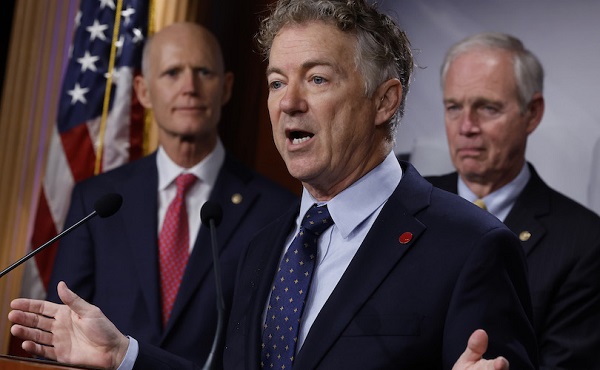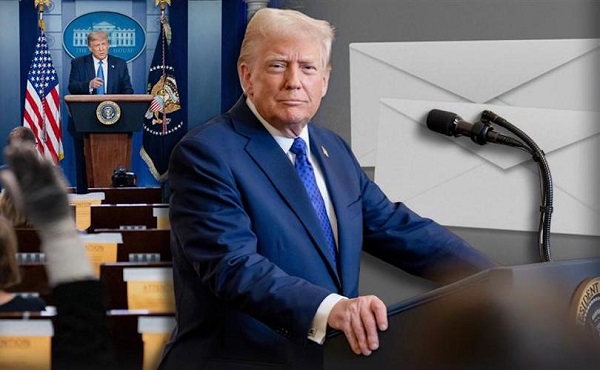International
US Senator Rand Paul warns against government emergency powers, cites Trudeau’s crackdown on Freedom Convoy

From LifeSiteNews
‘If anyone doubts that emergency powers can be abused, just look to Canada,’ Rand Paul said about Justin Trudeau’s ‘abuse’ of power against the Freedom Convoy and people who donated to it.
Kentucky Senator Rand Paul warned against giving governments emergency powers, citing Canadian Prime Minister Justin Trudeau’s “abuse” of power against the Freedom Convoy.
During a December 17 session of the U.S. Senate, Paul, who is about to take over as chair of the U.S. Senate Committee on Homeland Security and Governmental Affairs, referenced Trudeau’s use of the Emergencies Act (EA) to shut down the 2022 Freedom Convoy to warn of the dangers of unchecked power.
“If anyone doubts that emergency powers can be abused, just look to Canada,” he declared.
Paul recalled February 14, 2022, when Trudeau invoked the Emergencies Act to clear out the Freedom Convoy in Ottawa, which protested COVID mandates.
At the time, truckers and other Canadians from across the country were camped out in front of Parliament to demand an end to the COVID restrictions and shot mandates that effectively made unvaxxed Canadians second class citizens, unable to travel or work in most jobs.
Trudeau had disparaged unjabbed Canadians, saying that those opposing his measures were of a “small, fringe minority” who hold “unacceptable views” and do not “represent the views of Canadians who have been there for each other.”
“Instead of simply clearing out protesters and punishing them via conventional legal means, Trudeau invoked emergency powers broad enough to permit the financial un-pursing of anyone participating in the protest,” Paul said.
“He went to their bank accounts and took their money,” Paul continued. “When people raised money voluntarily through crowd financing to help these truckers, he stole that money as well through martial rule, without any rule of law.”
Under the EA, the Trudeau government froze the bank accounts of Canadians who donated to the protest, leaving many Canadians struggling to buy necessities. Trudeau finally revoked the EA on February 23 after the protesters had been cleared out. At the time, seven of Canada’s 10 provinces opposed Trudeau’s use of the EA.
Last January, Federal Court Justice Richard Mosley ruled that Trudeau was “not justified” in invoking the Emergencies Act. Furthermore, Trudeau’s former public safety minister is currently facing censure for “deliberately lying” about EA invocation.
Paul used Canada’s story as a “cautionary tale” against expanding any emergency powers for the federal government through the Department of Homeland Security. He warned that if either the Republican or Democratic Party is given emergency powers, it “could be turned inward against political dissent.”
“Men and women will succumb to the desire for power,” he explained. “It’s inherent in all. That’s why we must have checks and balances.”
“Trudeau could freeze a bank account without a court order, without due process,” Paul warned. “And while native-born Americans may think that emergency powers are to be used to target others, I would venture to guess that the Canadian truckers protesting COVID era mandates didn’t expect that their government would treat them as foreign adversaries and freeze their accounts.”
“If it can happen in Canada, it can happen in the U.S.,” he declared.
Daily Caller
AI Needs Natural Gas To Survive


From the Daily Caller News Foundation
By David Blackmon
As recent studies project a big rise in power generation demand from the big datacenters that are proliferating around the United States, the big question continues to focus in on what forms of generation will rise to meet the new demand. Most datacenters have plans to initially interconnect into local power grids, but the sheer magnitude of their energy needs threatens to outstrip the ability of grid managers to expand supply fast enough.
This hunger for more affordable, 24/7 baseload capacity is leading to a variety of proposed solutions, including President Donald Trump’s new executive orders focused on reviving the nation’s coal industry, scheduled to be signed Tuesday afternoon. But efforts to restart the permitting of new coal-fired power plants in the US will require additional policy changes, efforts which will take time and could ultimately fail. In the meantime, datacenter developers find themselves having to delay construction and completion dates until firm power supply can be secured.
Datacenters specific to AI technology require ever-increasing power loads. For instance, a single AI query can consume nearly ten times the power of a traditional internet search, and projections suggest that U.S. data center electricity consumption could double or even triple by 2030, rising from about 4-5% of total U.S. electricity today to as much as 9-12%. Globally, data centers could see usage climb from around 536 terawatt-hours (TWh) in 2025 to over 1,000 TWh by 2030. In January, a report from the American Security Project estimated that datacenters could consume about 12% of all U.S. power supply.
Obviously, the situation calls for innovative solutions. A pair of big players in the natural gas industry, Liberty Energy and Range Resources, announced on April 8 plans to diversify into the power generation business with the development of a major new natural gas power plant to be located in the Pittsburgh area. Partnering with Imperial Land Corporation (ILC), Liberty and Range will locate the major power generation plant in the Fort Cherry Development District, a Class A industrial park being developed by ILC.
“The strategic collaboration between Liberty, ILC, and Range will focus on a dedicated power generation facility tailored to meet the energy demands of data centers, industrial facilities, and other high-energy-use businesses in Pennsylvania,” the companies said in a joint release.
Plans for this new natural gas power project follows closely on the heels of the March 22 announcement for plans to transform the largest coal-fired power plant in Pennsylvania, the Homer City generating station, into a new gas-fired facility. The planned revitalized plant would house 7 natural gas turbines with a combined capacity of 4.5 GW, enough power 3 million homes.
Both the Homer City station and the Fort Cherry plant will use gas produced out of the Appalachia region’s massive Marcellus Shale formation, the most prolific gas basin in North America. But plans like these by gas companies to invest in their own products for power needs aren’t isolated to Pennsylvania.
In late January, big Permian Basin oil and gas producer Diamondback Energy told investors that it is seeking equity partners to develop a major gas-fired plan on its own acreage in the region. The facility would primarily supply electricity to data centers, which are expected to proliferate in Texas due to the AI boom, while also providing power for Diamondback’s own field operations. This dual-purpose approach could lower the company’s power costs and create a new revenue stream by selling excess electricity.
Prospects for expansion of gas generation in the U.S. received a big boost in January when GE Vernova announced plans for a $600 million expansion of its manufacturing capacity for gas turbines and other products in the U.S. GE Vernova is the main supplier of turbines for U.S. power generation needs. The company plans to build 37 gas power turbines in 2025, with a potential increase to over 70 by 2027, to meet rising energy demands.
The bottom line on these and other recent events is this: Natural gas is quickly becoming the power generation fuel of choice to feed the needs of the expanding datacenter industry through 2035, and potentially beyond. Given that reality, the smart thing to do for these and other companies in the natural gas business is to put down big bets on themselves.
David Blackmon is an energy writer and consultant based in Texas. He spent 40 years in the oil and gas business, where he specialized in public policy and communications.
International
Trump White House will ignore reporter emails that include ‘preferred pronouns’ in signature

From LifeSiteNews
“Any reporter who chooses to put their preferred pronouns in their bio clearly does not care about biological reality or truth and therefore cannot be trusted to write an honest story”
The White House will ignore all emails from reporters which include preferred gender pronouns in their email signatures according to Press Secretary Karoline Leavitt.
“Any reporter who chooses to put their preferred pronouns in their bio clearly does not care about biological reality or truth and therefore cannot be trusted to write an honest story,” Leavitt wrote in response to a request for comment from the New York Times.
The practice of citing one’s preferred gender pronouns, which is increasingly prevalent among leftists, stems from gender ideology, the idea that people have a “gender identity” that is distinct from their sex. Thus, for example, women who identify as males may include the gender pronouns “he/him” in their email signature or other identifiers.
Leavitt had previously stated to a NYT reporter who inquired about the potential closure of a climate research observatory, “As a matter of policy, we do not respond to reporters with pronouns in their bios.”
The New York Times reported that Katie Miller, senior advisor for the Department Of Government Efficiency (DOGE), had weeks prior declined another question from a Times reporter, for the same reason.
“As a matter of policy, I don’t respond to people who use pronouns in their signatures as it shows they ignore scientific realities and therefore ignore facts,” Miller said in an email. In a separate message, she noted, “This applies to all reporters who have pronouns in their signature.”
-

 2025 Federal Election1 day ago
2025 Federal Election1 day agoResearchers Link China’s Intelligence and Elite Influence Arms to B.C. Government, Liberal Party, and Trudeau-Appointed Senator
-

 2025 Federal Election1 day ago
2025 Federal Election1 day agoRCMP memo warns of Chinese interference on Canadian university campuses to affect election
-

 Alberta2 days ago
Alberta2 days agoAlberta takes big step towards shorter wait times and higher quality health care
-

 Energy2 days ago
Energy2 days agoTrump signs four executive orders promoting coal industry
-

 COVID-1922 hours ago
COVID-1922 hours agoFauci, top COVID officials have criminal referral requests filed against them in 7 states
-

 MAiD2 days ago
MAiD2 days agoDisability rights panel calls out Canada, US states pushing euthanasia on sick patients
-

 Justice2 days ago
Justice2 days agoCanadian government sued for forcing women to share spaces with ‘transgender’ male prisoners
-

 Bjorn Lomborg1 day ago
Bjorn Lomborg1 day agoThe stupidity of Net Zero | Bjorn Lomborg on how climate alarmism leads to economic crisis









